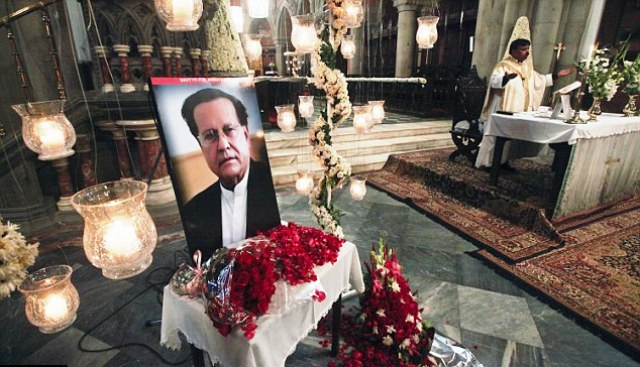
Why should we remember Salmaan Taseer?
Salman Taseer spoke against religious fanaticism and what did he get in return? 27 bullets by his own security guard.
January 4 and 5 are two days that every PPP (Pakistan Peoples Party) supporter will remember, but for two very different reasons. January 5 is the birthday of their enigmatic party founder Zulfiqar Ali Bhutto. January 4, on the other hand, remains one of the darkest days in our history of political murders – a day that is, surprisingly, not spoken of enough.
January 4, 2011, was the day when the serving Governor of Punjab, Salmaan Taseer, was shot dead by his guard, because the guard was in disagreement with Taseer’s opposition to the blasphemy law. Salmaan Taseer’s assassin was a man called Malik Mumtaz Hussain Qadri, reportedly a member of Dawat-e-Islami.
 Malik Mumtaz Hussain Qadri, Salman Taseer's assassin. Photo: AFP
Malik Mumtaz Hussain Qadri, Salman Taseer's assassin. Photo: AFPMurder of any kind is unacceptable. It is the most heinous of crimes known to man. However, murdering in the name of religion takes the crime to a whole new twisted and sick level. It exposes the fragility of religion and how it can be used to brainwash individuals into mindless submission to laws that, they believe, are superior to basic principles of humanity.
Taseer’s assassination was a classic example of this.
Taseer had the courage to stand up for a woman from a religious minority, who was imprisoned because of a particular law. This said law, the blasphemy law as commonly known, is a small drop in the ever expanding ocean of fundamentalism in Pakistan.
 The body of the governor of Punjab province Salmaan Taseer is carried out of a hospital after he was shot dead in Islamabad January 4, 2011. Photo: AFP
The body of the governor of Punjab province Salmaan Taseer is carried out of a hospital after he was shot dead in Islamabad January 4, 2011. Photo: AFPWho was that woman?
Most of us would have probably forgotten her name because she has fallen in the background of idiotic and irrelevant arguments, such as that over the wall at Bilawal House.
Her name was Aasia Bibi.
Belonging to a village near Sheikhupura in Punjab, where hers was the only Christian family, she got into an argument over drinking water at work. Her fellow Muslim workers did not approve of a Christian drinking from the same cup as them. Emotions soared, her co-workers targeted her religion and she targeted theirs. First the local cleric and then the police was involved, and soon Aasia was imprisoned. Because Pakistan’s Sharia system considers a non-Muslim’s testimony to carry half the weight of a Muslim’s, she had difficulty defending herself in court and was finally sentenced to death by a judge in Sheikhupura; thus becoming the first woman in our history condemned to death on blasphemy charges.
As expected, protests ensued across the country.
https://twitter.com/shehrbanotaseer/status/347651614464688128
The religious-right in the country displayed its ever-present knack for savagery, demanding that Aasia be hanged and even offering a bounty for anyone who would kill her. Some foamed at their mouths, beards wet with saliva, Arabic accents strong and eyes red. Others shook their heads in disgust and spoke up.
Salmaan Taseer was one of them.
What did he get in return?
Death from 27 bullets – by his own guard.
 Policemen secure the site of a fatal attack on Salmaan Taseer, the governor of Punjab, by his bodyguard in Islamabad on January 4, 2011. Photo: AFP
Policemen secure the site of a fatal attack on Salmaan Taseer, the governor of Punjab, by his bodyguard in Islamabad on January 4, 2011. Photo: AFPA lesson needs to be learnt here. One that we have struggled to learn ever since Ziaul Haq’s religious bigotry completely altered the course of our country. Religious fanaticism cannot, and should not, be tolerated at any cost. The misuse of religion is the single reason this country has gone to the dogs and turned into a hotbed of extremism and terrorism.
If we had learned to accept religion as a personal matter, kept it separate from the state and not introduced laws promoting prejudice and hatred, we would have been in a much better shape. People need to speak up – the larger, the better.
There can be no neutrals here.
Being neutral is worse than sympathising with the fanatics.
This country needs more people like Salmaan Taseer. More people like Shahbaz Bhatti. Political affiliations need to be kept aside and affiliations based on common sense need to be brought to the fore front, especially on issues like these.
 A portrait of the assassinated governor of Punjab Salman Taseer is displayed during a Sunday service at the Cathedral Church of the Resurrection in Lahore. Photo: Reuters
A portrait of the assassinated governor of Punjab Salman Taseer is displayed during a Sunday service at the Cathedral Church of the Resurrection in Lahore. Photo: ReutersSalmaan Taseer was certainly not a leader of the masses. He didn’t have the charisma of Bhutto or the populist support of Benazir. He was, however, a man who believed in a liberal Pakistan. He believed in a country where freedom of speech was not frowned upon and where religious extremism was not ripe. However, such a country is a far cry from the Pakistan of today.
His political and business achievements or shortcomings all fall in the backdrop of his stance on this issue. A courageous man who spoke sense and stood against extremism as everyone else was surrounded by an ugly haze. It is because of these reasons that Salmaan Taseer should be remembered.
He was the voice of a liberal Pakistan.
He was the voice of a courageous Pakistan.




COMMENTS (62)
Comments are moderated and generally will be posted if they are on-topic and not abusive.
For more information, please see our Comments FAQ